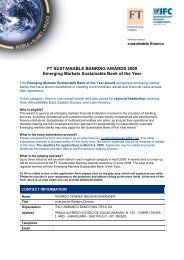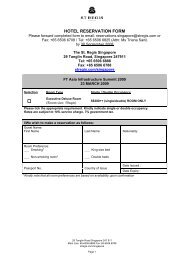2011 Summary can be downloaded HERE - FT Live
2011 Summary can be downloaded HERE - FT Live
2011 Summary can be downloaded HERE - FT Live
You also want an ePaper? Increase the reach of your titles
YUMPU automatically turns print PDFs into web optimized ePapers that Google loves.
Exclusive Interactive Discussion with the Hon’ble Finance Minister of India<br />
6<br />
Shri Pranab Mukherjee<br />
Hon’ble Finance Minister<br />
Government of India<br />
I am very happy to join you all at the first Financial<br />
Times-YES BANK International Banking Summit, even<br />
though it is only in a virtual sense. Let me <strong>be</strong>gin by<br />
congratulating Dr. Rana Kapoor and his partners for<br />
organizing this Summit and bringing together distinguished<br />
panel of bankers, financial experts, investors, policy makers<br />
and regulators to deli<strong>be</strong>rate on contemporary issues of<br />
relevance to India's growing financial sector. I am happy to<br />
see the themes such as banking reforms, cross-border<br />
strategic alliances and rural development and financial<br />
inclusion that you have addressed in your discussion over the<br />
two days of the Summit.<br />
The Indian financial sector has seen signifi<strong>can</strong>t<br />
transformation, rapid growth and global integration over the<br />
last decade. The banking sector has shown great resilience in the course of the global financial crisis and its<br />
continuing aftermath. The fact that India has not gone through any major financial turbulence, as a result of the<br />
earlier phase of financial deregulation is a testimony to<br />
our consistent view that reforms in global standards<br />
have to <strong>be</strong> adapted to local conditions.<br />
The economic reforms initiated during the early 1990s<br />
have borne good results for the Indian economy. The<br />
economy has moved on to a higher growth trajectory,<br />
with improved fundamentals and resilience to external<br />
and domestic shocks.<br />
The basic objective of the financial sector reforms has<br />
<strong>be</strong>en to promote a diversified, efficient and competitive<br />
financial system, with the ultimate objective of<br />
improving the allocative efficiency of resources. This has<br />
“Congratulations to Dr. Rana Kapoor<br />
and his partners for organizing this<br />
Summit and bringing together<br />
distinguished panel of bankers,<br />
financial experts, investors, policy<br />
makers and regulators to deli<strong>be</strong>rate on<br />
contemporary issues of relevance in<br />
India's growing financial sector”<br />
<strong>be</strong>en sought by ensuring greater operational flexibility, improved financial viability and strengthening of<br />
regulatory institutions. The reforms were carefully sequenced in respect of policy instruments and in terms of<br />
specific objectives that had to <strong>be</strong> addressed.<br />
We have taken steps in recent months, to take this process forward. Legislations have <strong>be</strong>en introduced in the<br />
Parliament to address some issues in the financial sector including insurance, banking, and pension sectors. We<br />
have set up Financial Sector Legislative Reforms Commission to review financial sector laws with the objective of<br />
bringing them in tune with current requirements and global <strong>be</strong>st practices. An apex-level Financial Stability and<br />
Development Council has <strong>be</strong>en established and is functioning to strengthen and institutionalize the mechanisms<br />
for maintaining financial stability and improving the inter-regulatory coordination.<br />
In the post-crisis period, financial stability has <strong>be</strong>come an integral part of policy discussions and macroeconomic
















